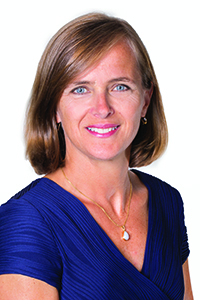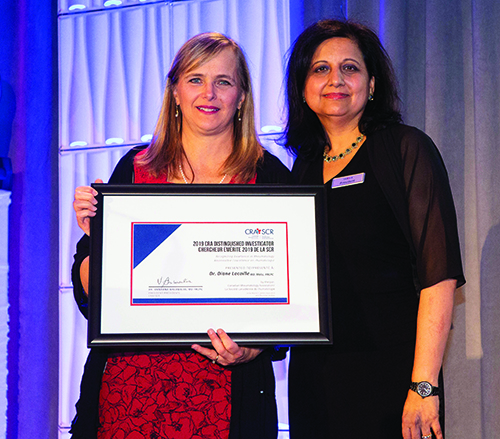Summer 2019 (Volume 29, Number 2)
Distinguished Investigator:
Dr. Diane Lacaille
Download PDF

You are credited as a pioneer in the
use of administrative data for quality
of care and pharmacoepidemiologic
research. What led you to focus
on these areas of interest?
The research questions I pursue in my
research program are usually inspired
by my clinical practice. I started my
practice in 2000, at a time when new
treatments and approaches completely
changed the landscape for rheumatoid
arthritis (RA) and opened the door to
new possibilities of controlling this
terrible disease and preventing joint
damage, in ways that had never been
possible before. But what struck me
early on, was that some patients were
completely left out of the game. They
were accessing care too late. Having the most effective medications
available is of no use, if patients are not accessing
care. This is what got me interested in evaluating quality of
care at the population level, having the ability to look at everyone
across the province, not just the people that we see
regularly in our practices.
I expected that care would not be perfect, but I was
shocked when I got the results of my first study showing
that only half of the patients in British Columbia labelled
as having RA by family physicians were being referred to
rheumatologists, or started on disease-modifying antirheumatic
drugs (DMARDs). At first, I didn't believe my results.
But then I remember, shortly after getting those results,
seeing a patient in clinic from a rural area, with advanced
RA deformities, who had never been on a disease-modifying
agent. I knew I was onto something real. Since then, others
have noted similar findings in other provinces. Things are
better now, but they're still not as good as they should be.
The problem is that we don't know what we don't see. We
have to design ways of systematically measuring the quality
of care received by everyone, if we want to understand care
gaps and improve things.
How has your work impacted the local Canadian RA
landscape?
I think these results were an eye-opener for many people.
In British Columbia, the Ministry of Health and arthritis
stakeholders embarked on a chronic
disease management strategy for arthritis.
Local RA guidelines for family
physicians were developed. These results
were instrumental in having RA
selected as a target for a provincial
Practice Support Program, which integrates
practical tools in physicians’
practices to support the management
of RA by family physicians. Nationally,
our research and that of others, identifying
similar gaps in care, sparked interest
in developing alternative models
of care and in developing systems to
evaluate the impact of those models of
care. The Arthritis Alliance of Canada
has done a lot of work in that regard.
You have explored the impact of community-based
research, for example with First Nations communities,
to develop and evaluate arthritis programs consistent
with Indigenous approaches to health. Why is “community-based” research important in the field of rheumatoid
arthritis?
When working in partnership with Indigenous communities,
a community-based approach to research is absolutely
essential. For research to have a real impact and properly
address the needs of the community, there has to be buy-in
for the research conducted. For this to happen, the community
has to be actively involved throughout the process:
Setting the research priorities, identifying the needs, providing
input, and ensuring that the arthritis services created
are consistent with their values and priorities. These
relationships take time to develop and have to be built on
trust and respect. Having arthritis services that are consistent
with Indigenous approaches to health will, hopefully,
help reduce the health inequalities observed in First Nations
communities.
Why did you focus on employment and developing
Making it WorkTM, the first comprehensive program to
prevent work disability in people with inflammatory arthritis?
As a rheumatologist, I see how people with arthritis often
struggle to continue working, and I recognize how much work means to our patients. It is much more than a source
of finances. It is an important part of their self-identity,
their sense of contribution to society, their social interactions,
and so much more! I am constantly amazed by people's
ability to continue forging ahead despite the challenges
they encounter at work. People are so resourceful!
Their resilience is what inspires me to continue on with my
research, to find ways to allow them to continue working,
because it matters so much to them.
What future directions do you wish to pursue in your own
research? What general developments would you like to
see in the field of rheumatology and arthritis care?
I want to continue to design and evaluate strategies to improve
the delivery of care for arthritis and for the other diseases
that occur as complications of inflammation. I think
that we need to leverage technology to improve care, at an
individual level, using eHealth technologies so people can be
more engaged in their care, like the app we have designed to
allow people to self-monitor their RA disease activity; as well
as at a system level, by taking advantage of electronic medical
records and other sources of data, so we can measure
and provide feedback in real time, for continuous quality improvement.
I think eHealth technology is going to transform
how we provide care in ways we can’t even imagine right now.
What advice would you give to someone looking to
pursue a career as an academic rheumatologist?
I would say that it is a very rewarding career. Yes, it requires
hard work and perseverance, there are many challenges
along the way, especially in the current funding environment.
One has to learn to let things roll off your back: the
grants that get rejected, the manuscripts that need to be
resubmitted. You learn what you can from it, and then move
on, and try again. It is also crucial to have a good mentor,
someone that can help you navigate the system, give
you wise counsel, have your best interest at heart and open
doors for you. It is also very important to not get overcommitted
in clinical work. Patients always come first, but one
needs protected research time to succeed.
But despite all the challenges, it is all well worth it! I
find my work continuously stimulating and intellectually
challenging. I love the diversity of my days. When projects
finally come to fruition, it is very satisfying to see or feel
the impact of the work done. Some of my most memorable
moments have been hearing participants from the Making
it Work program describe how much this program has
changed their lives and how much it has meant to them.
What is your guilty pleasure television show?
I don’t watch any TV at all! Only the Olympics and the news.
What is your favourite place to travel to?
My favourite travelling is taking off on our sailboat and
heading north along the coast to places where only boats
can go, away from the roads, where you can’t hear any cars.
I cherish the moment we turn off the engine, let the wind
fill the sails and feel at one with the ocean. It doesn’t matter
where we are, I just love being at anchor at night in a quiet
bay, watching the night fall and the stars appear in the sky.
Drs. John Esdaile and Kam Shojania presented a hilarious
video at the CRA Gala introducing your award.
What are they like to work with?
They are extremely smart, as quick and witty as in the video,
and incredibly supportive! I could not have asked for a better
mentor and a more supportive Division Head.

Dr. Diane Lacaille receiving her award from Dr. Vandana Ahluwalia.
Diane Lacaille, MD, FRCPC, MHSc
Mary Pack Chair in Rheumatology Research
Professor of Rheumatology,
University of British Columbia
Senior Research Scientist,
Associate Scientific Director,
Arthritis Research Canada
Richmond, British Columbia
|
